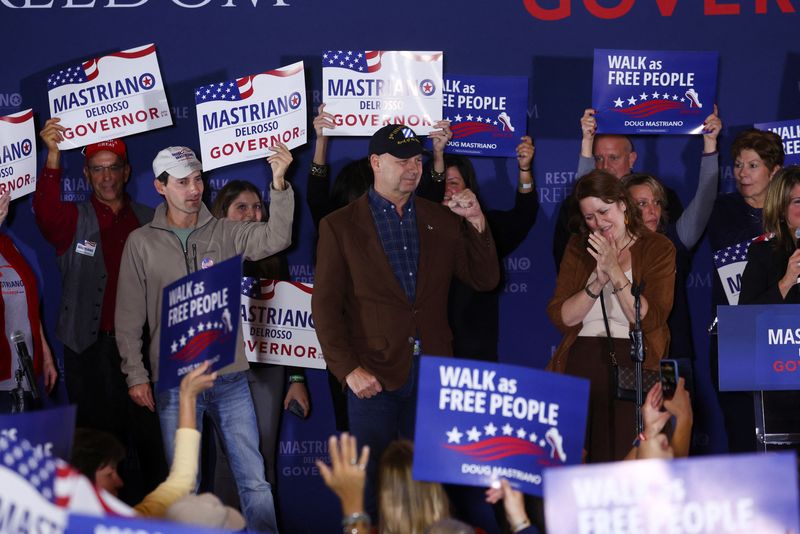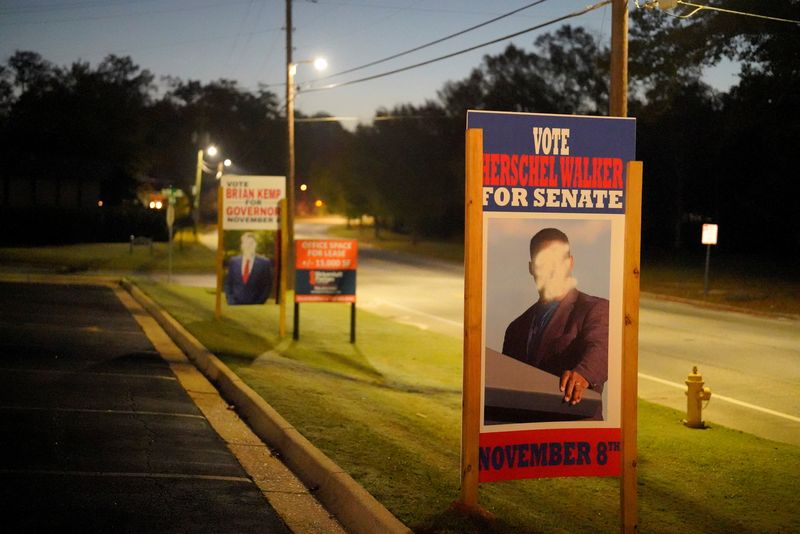By Julia Harte and Daniel Trotta
(Reuters) - Democratic governors in several presidential battleground states narrowly defended their seats in Tuesday's U.S. midterm elections, defeating Republican challengers who had embraced former President Donald Trump's false claims of voter fraud in the 2020 election.
Though gubernatorial races typically get less attention than the battle for control of Congress, they carried high stakes this year for issues such as abortion access, transgender rights, guns and future elections in those states.
Here are results from the most consequential gubernatorial races, as forecast by data provider Edison Research:
KANSAS
Kansas Governor Laura Kelly held off Republican challenger Derek Schmidt, winning the only governorship that Democrats were defending in a state won by Trump in 2020.
Kelly ran on funding education and transportation infrastructure. Schmidt, the state's attorney general, tried to link Kelly to Biden on issues such as inflation and transgender rights.
Kelly, seen as perhaps the most vulnerable Democratic governor seeking re-election this year, may have been helped by independent candidate Dennis Pyle, who had been expected to capture some of the conservative vote.
MICHIGAN
Democratic Michigan Governor Gretchen Whitmer won a second term as expected, fending off Trump-backed conservative commentator Tudor Dixon in a race dominated by debate over abortion access in Michigan.
Whitmer promised to defend women's access to abortion in the state after the U.S. Supreme Court overturned the constitutional right to abortion. Dixon, a Republican, supported a near-total ban on abortion, including for child victims of rape and incest.
WISCONSIN
Democratic Wisconsin Governor Tony Evers narrowly won re-election, defending his seat against Republican construction magnate Tim Michels, who had falsely claimed that Trump won the 2020 election.
Michels had promised, if elected, to enforce a 19th-century abortion ban that Evers is challenging in court.
NEW MEXICO
Democratic incumbent Michelle Lujan Grisham won re-election, surviving a challenge from Republican Mark Ronchetti, a former television weatherman, in New Mexico's gubernatorial contest.
Lujan Grisham's campaign emphasized abortion rights as she directed $10 million in state money to build an abortion clinic near the Texas border, while Ronchetti supported banning abortion after 15 weeks of pregnancy.
MAINE
Democratic Maine Governor Janet Mills won a second term by defeating Republican Paul LePage, who served as governor of the state from 2011 to 2019. Mills ran on a platform that emphasized healthcare, especially her support for abortion rights in the wake of the June U.S. Supreme Court decision that ended the recognition of a constitutional right to the procedure.
LePage faced criticism during his time in office for making racist and violent comments that led some state lawmakers to question his fitness to serve.
NEW YORK
Democratic New York Governor Kathy Hochul secured her seat, winning a race that tightened in recent weeks against Republican challenger Lee Zeldin, a U.S. congressman from Long Island.
Hochul, the state's former lieutenant governor who took office last year after Governor Andrew Cuomo resigned over sexual harassment accusations, became the first woman elected governor in the state. She focused on defending the gun laws she had passed and promoting heavier police presence in the New York City subway.
Hochul's campaign also attacked Zeldin's ties to Trump and warned that Zeldin would roll back abortion rights in New York if elected.
GEORGIA
Republican Governor Brian Kemp fended off Democratic nominee Stacey Abrams in a rematch of Georgia's close 2018 gubernatorial election, winning by a wider margin with the benefit of incumbency.
Abrams was seeking to become the first Black woman to serve as a governor in the United States. Her voter registration efforts were credited with helping President Joe Biden win Georgia in 2020 and two Democrats capture the state's U.S. Senate seats in 2021.
Polls consistently showed Kemp ahead this year, even after he irked Trump and his supporters by refusing the former president's entreaties to falsely declare Trump the winner in the state in 2020.
PENNSYLVANIA
Pennsylvania Democratic Attorney General Josh Shapiro won the state's gubernatorial election against Republican state Senator Doug Mastriano, who had echoed Trump's false claims of voter fraud and was present at the U.S. Capitol on Jan. 6, 2021 - the day of a deadly riot - to protest the outcome of the 2020 presidential election.
Shapiro will choose the battleground state's top elections official, with the 2024 presidential election looming. He also will have the power to block or advance efforts by the Republican-led state legislature to severely restrict abortions.
TEXAS
Republican Texas Governor Greg Abbott easily won a third term, defeating his Democratic challenger, former U.S. Representative Beto O'Rourke.
Abbott, who was endorsed by Trump, backed increasingly conservative policies in his second term, including opposing COVID-19 vaccine and mask mandates. He also signed the most restrictive abortion ban of any U.S. state and has bused thousands of migrants to Democratic-controlled parts of the United States since April.
FLORIDA
Republican Governor Ron DeSantis won a second term in Florida by defeating Democratic challenger Charlie Crist in what was widely seen as a precursor to a DeSantis 2024 presidential run.
DeSantis has been at the forefront of a number of the country's partisan fights, bucking COVID-19 restrictions while backing a law limiting discussion of LGBTQ issues in schools.
Crist is a former Republican governor who switched parties and was elected to the U.S. House of Representatives as a Democrat. He tried to appeal to moderate Republicans in a onetime political swing state that has tilted further to the right in recent years.
ARIZONA
Widely seen as one of the closest gubernatorial races in the country, the contest for Arizona's open governorship pits Secretary of State Katie Hobbs, a Democrat, against former news anchor Kari Lake, a Republican.
Hobbs rose to national prominence in 2020 when she defended Arizona's election results against Trump's false claims of voting fraud. Lake, who received the former president's endorsement, has embraced those claims and vowed to ban mail-in voting if she wins.
NEVADA
Incumbent Steve Sisolak, a Democrat, has emphasized the protection of legal abortion in his campaign for a second term, in addition to issues such as education, expanding child care and affordable housing.
Polls show him in a close race with Republican Joe Lombardo, the Clark County sheriff and a former U.S. Army soldier who has run on supporting law enforcement and cutting public spending.
Although Trump endorsed him, Lombardo has sought to distance himself from the former president, accepting the 2020 elections results as legitimate. When asked in a debate whether Trump was a great president, Lombardo responded, "I wouldn't use that adjective."
OREGON

A close three-way race could see Oregon's governorship go to a Republican for the first time since 1982. Democrat Tina Kotek is squaring off against Republican Christine Drazan and a strong independent candidate, Betsy Johnson.
Kotek has run hard on gun violence prevention, while Johnson has emphasized supporting police and gun rights. Drazan has campaigned on public safety and order in a state that experienced sometimes-violent protests over racial equality and police brutality in 2020 and 2021, saying either of her opponents would represent a third term for Democratic Governor Kate Brown, who could not run again because of term limits.
